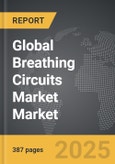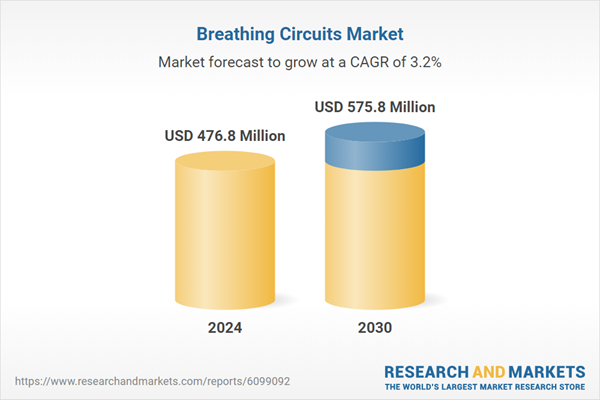Global Breathing Circuits Market - Key Trends & Drivers Summarized
Why Are Breathing Circuits Critical Components in Modern Anesthesia Delivery and Respiratory Care Systems?
Breathing circuits are fundamental components in mechanical ventilation, anesthesia delivery, and critical care respiratory support. These closed or semi-closed systems facilitate the controlled delivery of oxygen, anesthetic gases, and air to patients, while efficiently removing exhaled carbon dioxide. Their use spans surgical theaters, intensive care units (ICUs), emergency departments, and home care environments - making them indispensable in both acute and chronic respiratory management. As the global burden of respiratory diseases, surgical procedures, and ICU admissions continues to rise, breathing circuits are vital in ensuring patient safety, ventilator performance, and procedural efficacy.Their role became even more pronounced during the COVID-19 pandemic, which accelerated awareness and investment in ventilator accessories, infection control measures, and respiratory infrastructure. Breathing circuits enable gas conditioning, humidification, and pressure regulation - functions essential for minimizing lung trauma and enhancing patient comfort in invasive and non-invasive ventilation contexts. Their relevance is expanding further as healthcare systems prioritize respiratory resilience and ventilator readiness across all levels of care.
How Are Product Innovations and Infection Control Priorities Shaping Breathing Circuit Advancements?
Innovation in breathing circuits is focused on improving airflow efficiency, infection prevention, and system compatibility. Manufacturers are introducing circuits with heat and moisture exchangers (HMEs), bacterial/viral filters, and integrated sensors to maintain airway humidification and prevent pathogen transmission between patient and ventilator. Single-use, disposable circuits are gaining widespread adoption to reduce the risk of cross-contamination - especially in high-volume clinical settings.Ergonomic designs with kink-resistant tubing, color-coded connectors, and universal port compatibility are enhancing ease of use and clinical workflow efficiency. Circuit designs are increasingly optimized for pediatric and neonatal populations, with lightweight, low-dead-space configurations that support sensitive lung mechanics. Additionally, hybrid solutions combining reusable elements with disposable interfaces are being introduced to balance infection control and cost containment in resource-constrained healthcare systems.
Where Is Demand for Breathing Circuits Rising and Which Clinical Settings Are Driving Usage?
North America and Europe lead global demand, driven by robust surgical volumes, ICU infrastructure, and regulatory mandates for respiratory safety. The U.S. market remains dominant, supported by advanced perioperative care and a high installed base of ventilators. Europe follows closely with stringent infection control standards and widespread integration of anesthesia circuits in surgical protocols. Asia-Pacific is witnessing rapid expansion, particularly in China and India, where public health investments and increasing access to surgical and critical care services are driving adoption.Key clinical settings include operating rooms (for anesthesia circuits), intensive care units (for long-term mechanical ventilation), and emergency departments (for resuscitation and acute care). Neonatal and pediatric ICUs are also significant users, requiring specialized circuit designs for fragile respiratory physiology. Beyond hospitals, demand is rising in ambulatory surgery centers, home care settings, and transport ventilator systems - where circuit portability and disposability are paramount.
What Is Fueling the Global Growth of the Breathing Circuits Market?
The global growth of the breathing circuits market is driven by rising procedural volumes, increasing prevalence of chronic respiratory conditions, and the global expansion of critical care infrastructure. Aging populations, greater access to surgical interventions, and heightened respiratory vigilance post-COVID-19 are reinforcing the need for reliable, infection-resistant breathing systems. Clinical guidelines mandating circuit replacement protocols and the shift toward single-use medical disposables are also expanding market opportunities.Ongoing technological integration with smart ventilators, demand for customizable configurations, and focus on patient-specific ventilation strategies are shaping product development. Manufacturers are investing in scalable production, sustainable materials, and regulatory compliance to meet rising global demand. As respiratory care becomes a cornerstone of acute and chronic disease management, a pivotal question defines future innovation: Can breathing circuit suppliers deliver advanced, cost-effective, and infection-safe solutions that adapt to the evolving needs of diverse patient populations and healthcare delivery models?
Report Scope
The report analyzes the Breathing Circuits market, presented in terms of market value (US$). The analysis covers the key segments and geographic regions outlined below:- Segments: Type (Open Breathing Circuits, Semi-Open Breathing Circuits, Semi-Closed Breathing Circuits, Closed Breathing Circuits); Application (Anesthesia, Respiratory Dysfunction, Other Applications); End-Use (Hospitals, Ambulatory Surgery Centers, Clinics, Other End-Uses).
- Geographic Regions/Countries: World; United States; Canada; Japan; China; Europe (France; Germany; Italy; United Kingdom; Spain; Russia; and Rest of Europe); Asia-Pacific (Australia; India; South Korea; and Rest of Asia-Pacific); Latin America (Argentina; Brazil; Mexico; and Rest of Latin America); Middle East (Iran; Israel; Saudi Arabia; United Arab Emirates; and Rest of Middle East); and Africa.
Key Insights:
- Market Growth: Understand the significant growth trajectory of the Open Breathing Circuits segment, which is expected to reach US$231.6 Million by 2030 with a CAGR of a 4%. The Semi-Open Breathing Circuits segment is also set to grow at 3.3% CAGR over the analysis period.
- Regional Analysis: Gain insights into the U.S. market, valued at $129.9 Million in 2024, and China, forecasted to grow at an impressive 6.1% CAGR to reach $114.5 Million by 2030. Discover growth trends in other key regions, including Japan, Canada, Germany, and the Asia-Pacific.
Why You Should Buy This Report:
- Detailed Market Analysis: Access a thorough analysis of the Global Breathing Circuits Market, covering all major geographic regions and market segments.
- Competitive Insights: Get an overview of the competitive landscape, including the market presence of major players across different geographies.
- Future Trends and Drivers: Understand the key trends and drivers shaping the future of the Global Breathing Circuits Market.
- Actionable Insights: Benefit from actionable insights that can help you identify new revenue opportunities and make strategic business decisions.
Key Questions Answered:
- How is the Global Breathing Circuits Market expected to evolve by 2030?
- What are the main drivers and restraints affecting the market?
- Which market segments will grow the most over the forecast period?
- How will market shares for different regions and segments change by 2030?
- Who are the leading players in the market, and what are their prospects?
Report Features:
- Comprehensive Market Data: Independent analysis of annual sales and market forecasts in US$ Million from 2024 to 2030.
- In-Depth Regional Analysis: Detailed insights into key markets, including the U.S., China, Japan, Canada, Europe, Asia-Pacific, Latin America, Middle East, and Africa.
- Company Profiles: Coverage of players such as Booby Tape, Bra Tape, Bring It Up, EONBON, Francesca’s Boob Tape and more.
- Complimentary Updates: Receive free report updates for one year to keep you informed of the latest market developments.
Some of the 48 companies featured in this Breathing Circuits market report include:
- AdvaCare Pharma
- Altera Corporation
- Ambu A/S
- Armstrong Medical Ltd
- Becton, Dickinson and Company
- Beijing Aeonmed Co., Ltd.
- Bio-Med Devices, Inc.
- Cardinal Health, Inc.
- Drägerwerk AG & Co. KGaA
- Fisher & Paykel Healthcare Ltd.
- Flexicare Medical Ltd.
- GaleMed Corporation
- GE Healthcare
- Inspiration Healthcare Group plc
- Medtronic plc
- ResMed Inc.
- Smiths Group plc
- Teleflex Incorporated
- Vyaire Medical, Inc.
- Zhejiang Haisheng Medical Device Co., Ltd.
This edition integrates the latest global trade and economic shifts into comprehensive market analysis. Key updates include:
- Tariff and Trade Impact: Insights into global tariff negotiations across 180+ countries, with analysis of supply chain turbulence, sourcing disruptions, and geographic realignment. Special focus on 2025 as a pivotal year for trade tensions, including updated perspectives on the Trump-era tariffs.
- Adjusted Forecasts and Analytics: Revised global and regional market forecasts through 2030, incorporating tariff effects, economic uncertainty, and structural changes in globalization. Includes historical analysis from 2015 to 2023.
- Strategic Market Dynamics: Evaluation of revised market prospects, regional outlooks, and key economic indicators such as population and urbanization trends.
- Innovation & Technology Trends: Latest developments in product and process innovation, emerging technologies, and key industry drivers shaping the competitive landscape.
- Competitive Intelligence: Updated global market share estimates for 2025, competitive positioning of major players (Strong/Active/Niche/Trivial), and refined focus on leading global brands and core players.
- Expert Insight & Commentary: Strategic analysis from economists, trade experts, and domain specialists to contextualize market shifts and identify emerging opportunities.
Table of Contents
Companies Mentioned (Partial List)
A selection of companies mentioned in this report includes, but is not limited to:
- AdvaCare Pharma
- Altera Corporation
- Ambu A/S
- Armstrong Medical Ltd
- Becton, Dickinson and Company
- Beijing Aeonmed Co., Ltd.
- Bio-Med Devices, Inc.
- Cardinal Health, Inc.
- Drägerwerk AG & Co. KGaA
- Fisher & Paykel Healthcare Ltd.
- Flexicare Medical Ltd.
- GaleMed Corporation
- GE Healthcare
- Inspiration Healthcare Group plc
- Medtronic plc
- ResMed Inc.
- Smiths Group plc
- Teleflex Incorporated
- Vyaire Medical, Inc.
- Zhejiang Haisheng Medical Device Co., Ltd.
Table Information
| Report Attribute | Details |
|---|---|
| No. of Pages | 387 |
| Published | February 2026 |
| Forecast Period | 2024 - 2030 |
| Estimated Market Value ( USD | $ 476.8 Million |
| Forecasted Market Value ( USD | $ 575.8 Million |
| Compound Annual Growth Rate | 3.2% |
| Regions Covered | Global |









